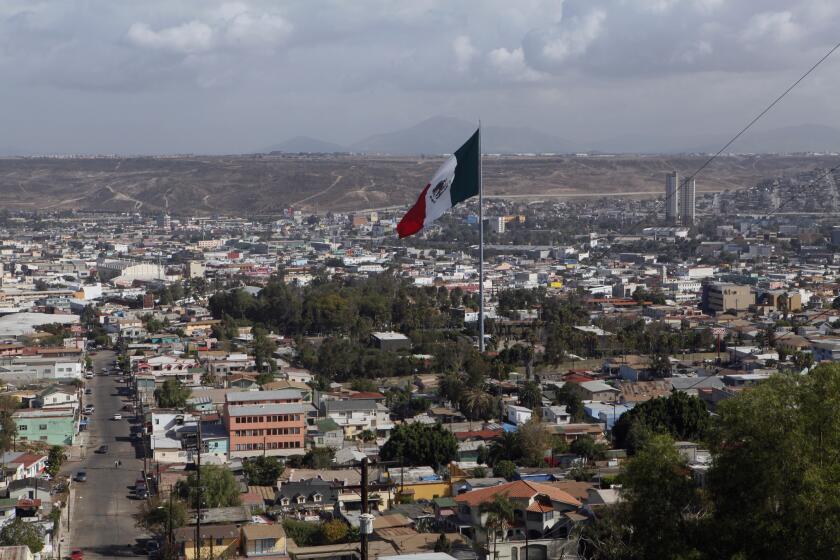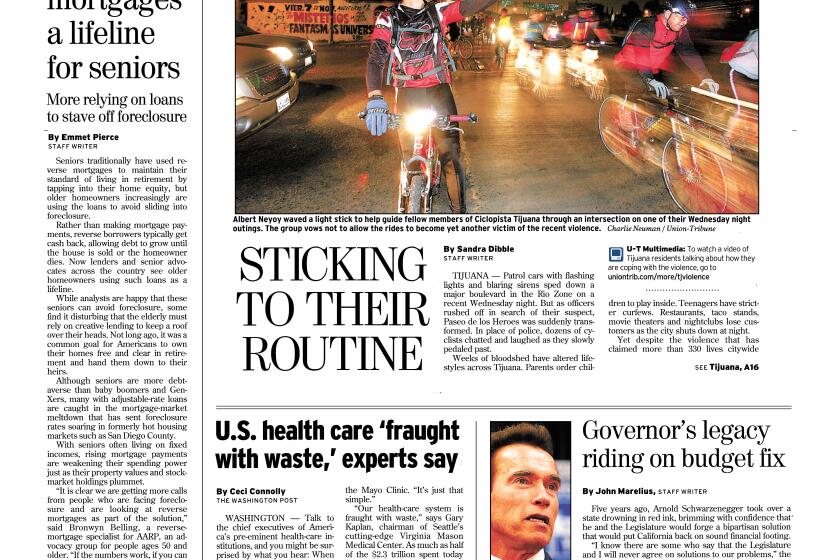Trump’s rhetoric prompts Mexican pushback
Republican presidential candidate Donald Trump’s proposals for mass deportations, for a continuous wall on the U.S. southern border, and for rolling back the North American Free Trade Agreement have been stirring alarm in Mexico. Now President Enrique Peña Nieto’s administration is pushing back, with a new campaign that aims to highlight the value of strong cross-border ties.
“We have built a relationship ... that has resulted in tremendous benefits for both countries,” Paulo Carreño, Mexico’s top diplomat for North America, said during a visit to San Diego this week. “I think we haven’t been very effective in communicating the importance of this relationship for so many people.”
Mexico’s new multi-layered strategy includes outreach efforts to a broad range of actors in the United States: academics, members of Congress, the private sector, media organizations, and civic leaders. It eventually could include an advertising campaign, but a more immediate plan is to have Mexico’s 49 U.S. consulates involved in changing public perceptions.
“We’re going to have them better explain this relationship with hard facts, with information about how this relationship is translating into benefits for all,” said Carreño, who in April was named undersecretary for North America in Mexico’s Foreign Ministry.
With the United States as Mexico’s largest trading partner — and Mexico the U.S.’s third largest partner — one major theme of the campaign will be using figures to show how trade benefits both sides, Carreño said.
“It’s not just to uplift the image of Mexico in the U.S.,” Carreño said. “It’s about uplifting the image of the whole bilateral relationship.”
Polls of U.S. attitudes commissioned by the Mexican government in 2014 and 2015 showed that “people usually don’t know that this relationship that we have built in the last three decades has a direct impact on their lives,” he said. The electoral process “gave us a clearer picture of how deteriorated, of how out of date was the image and the perception of the whole bilateral relationship,” he said.
Mexico is hoping to emulate the success of efforts in the early 1990s to change attitudes about free trade — an effort that involved consulates, the private sector, and civil society in Mexico, the United States and Canada. At the outset of the campaign, public sentiment about NAFTA ran 70 percent against, Carreño said, but by the end of the campaign, the treaty had 70 percent backing.
Carreño’s background is not as a diplomat but in the fields of public relations and corporate communications. His last job was as head of international media relations for the Mexican president and director of Marca País, an effort to improve Mexico’s image abroad. His appointment signaled a change in strategy for the Peña Nieto administration, as did the naming of a veteran diplomat, Carlos Sada, as the country’s ambassador to Washington, D.C.
“There really is a much deeper relationship between Mexico and the U.S. than most Americans realize, and it’s good that the Mexican government wants to be pro-active in talking about that,” said Andrew Selee, a Mexico expert and executive vice president at the Wilson Center in Washington, D.C. “I think the real question is, is this a marketing campaign, or is this an attempt to engage people who actually have a stake in the relationship?”
Mexico and the United States for years have built a strong government-to-government relationship, collaborating on a range of issues — from law enforcement to science to the environment. “It’s going to take much more than the demagoguery and xenophobia of Trump to derail that,” said Arturo Sarukhan, a former Mexican ambassador to the United States.
“What has changed is that the public narratives on both sides of the border as to what each side has at stake in the relationship has been thrown back 20 years thanks to Donald Trump,” Sarukhan said. Trump’s impact on the narrative of the bilateral relationship, he said, has forced Mexico and Mexicans to rethink how to engage with the United States.
But Sarukhan cautioned against a strategy that is overly focused on Mexico’s image abroad without addressing very real domestic problems, such as corruption, violence and impunity.
“Unless you move the needle on those fronts domestically, there’s very little you’re going to achieve in changing the perception of Mexico abroad,” he said.
The growing concern in Mexico about the U.S. political climate has not just been coming from the Mexican government. Mexicans at every level have been speaking out, from academics to journalists to former President Vicente Fox. In the United States, members of a Mexican-American business group, the Asociacion de Empresarios Mexicanos, this year launched a lobbying group, the American Mexico Public Affairs Committee.
Among the group’s aims are “lobbying decision-makers at the federal level for the advancement and strengthening of the U.S.-Mexico relationship,” according to a description on its website.
“I see it as the seed of an awakening in the United States among those who are members of the Mexican-American diaspora,” said Sarukhan. “But there has to be a firewall — it cannot be funded, run or controlled by the Mexican government.”
Carreño’s swing through San Diego included meetings with San Diego Mayor Kevin Faulconer, with members of the cross-border business community, and a visit to the University of California San Diego campus, where he helped launch a cross-border collaboration between the Jacobs School of Engineering and the National Autonomous University of Mexico to develop materials for use in industry that can resist high temperatures and other extreme conditions.
“It’s a true binational effort, in the sense that two of the most prestigious universities in both countries are putting resources, are putting professors, to build a new generation of students,” Carreño said. “Small as it may seem to the unexpert eye,” he said, the agreement “is a good example that what we’re building is bridges.”
sandra.dibble@sduniontribune.com
Get Essential San Diego, weekday mornings
Get top headlines from the Union-Tribune in your inbox weekday mornings, including top news, local, sports, business, entertainment and opinion.
You may occasionally receive promotional content from the San Diego Union-Tribune.











